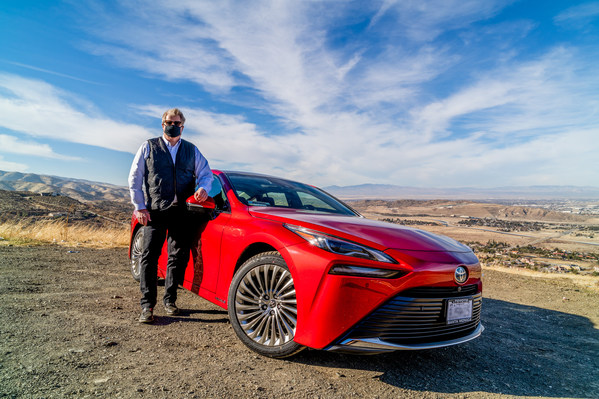LANCASTER, Calif., Feb. 22, 2021 /PRNewswire/ -- In partnership with the City of Lancaster, Lex Heslin, Senior Project Developer at Hitachi Zosen Inova, the Swiss/Japanese energy and engineering firm, was the first of a lucky handful of motorists to take delivery of the new 2021 "Mirai" Fuel Cell Electric Vehicle (FCEV) in the United States this month. Heslin is currently working with the City of Lancaster to advance its plans to become the first Hydrogen City and expand the hydrogen electric vehicle market.

Lancaster has been a pioneer in green energy for over a decade. Mayor R. Rex Parris stated "our current energy alternatives are not enough to reach our goals. We see hydrogen as a viable solution that will reduce carbon emissions not only for our residents but everyone -- improving the air we breathe, providing secure and reliable energy, and creating skilled jobs within the industry."
This latest model of Mirai, which means "future" in Japanese, is built on the rear-wheel drive GA-L platform of the larger Lexus LS sedan. This allows for increased hydrogen storage, bringing the car's Environmental Protection Agency's (EPA)-estimated range to over 300, a 30 percent increase over the first-generation front-wheel drive Mirai. The fuel cell system has also been redesigned to offer more power delivered to the 20-inch alloy wheels.
As members of the California Fuel Cell Partnership, the City of Lancaster collaborates with partners on activities that advance the technology that is aimed at expanding the market for fuel cell electric vehicles powered by hydrogen to help create a cleaner, more energy-diverse future with no-compromise zero emission vehicles.
"The Mirai is proof that hydrogen works," said Heslin. "It has a much longer range than any of the current electric vehicles (EVs), and takes only minutes to fill up compared to charging batteries, which can take hours. California currently has 45 hydrogen (H2) filling stations. That number will increase to 100 in 2023, with plans to top 1,000 stations by 2030."
Hydrogen Evolution in Commercial Transport
"The Mirai showcase in Lancaster represents a considerable leap forward, in line with the critical mission to decarbonize the planet quickly," Mayor R. Rex Parris said. "Battery electric vehicles (BEVs) are an important zero emission technology. Unfortunately, they draw from the power grid, which relies largely on fossil fuels Increased adoption of large commercial electric vehicles for transporting goods and people, however, would require bigger lithium batteries ushering in a host of new environmental problems. The game-changing application for hydrogen is long haul and heavy-duty transport," Mayor Parris said. "Imagine self-driving, zero-emission trucks that can cross the country with only a few quick stops to refuel."
Hydrogen (H2) by contrast has a much higher energy density than energy stored in electric vehicle batteries. H2 can be stored in vast quantities for long periods of time with on-demand retrieval capacity. The fuel also integrates into existing infrastructure like pipelines and power plants as an alternative to fossil-based natural gas.
"Hydrogen provides a doable solution to the challenge of decarbonization now," said Heslin, whose firm develops clean energy and infrastructure projects around the world, including an anaerobic digestion (AD) waste facility in the City of Lancaster. Heslin is also advising the city on the nation's first municipal hydrogen-powered microgrid providing hydrogen generation and storage for resiliency, energy management and cost savings. "Hydrogen is the next important fuel for the world and we'll be seeing a lot more of it soon. In Lancaster, it will be very soon."